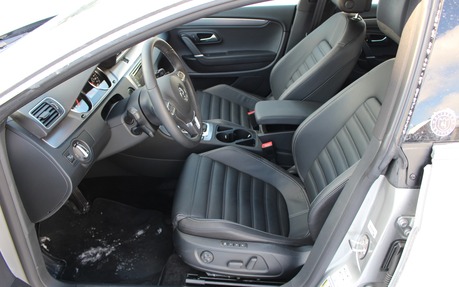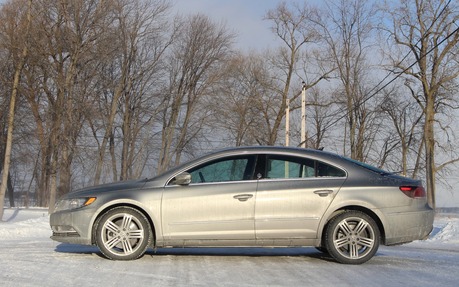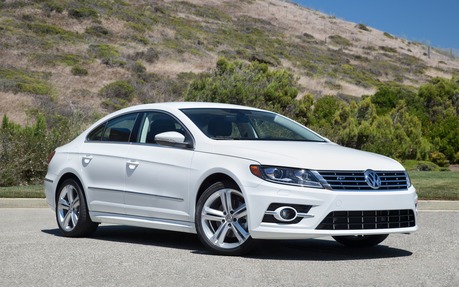2017 Volkswagen CC: Last Lap
The CC has been on the market for quite a while now. It used to be called the Passat CC, but changed its name for the 2012 model year to set itself apart from the redesigned, North-American (read: bigger) version of the Passat midsize sedan.
The CC is one of the first models on the market to boast the four-door coupé style, and the only one produced by a mainstream brand. Today, every automaker’s styling teams seem to be trying to incorporate a fastback profile to their sedans, yet the CC is still unique.
Although it’s still beautiful, the CC is showing its age, and as it enters its final year of production before being replaced by the Volkswagen Arteon, which should soon be revealed, it’s only offered in one trim level. In addition, the 2017 Volkswagen CC Wolfsburg Edition is equipped with one sole engine choice.
Last year, the CC was equipped solely with a turbocharged, 2.0-litre four-cylinder engine while the 3.6-litre V6 was retired. Which made perfect sense, as very few midsize sedan buyers actually choose the bigger or more powerful engine option. In a strange turn of events, the 2017 model ditches the four-banger engine while the V6 is making a comeback, if only a temporary one. Oh, and all-wheel drive is standard.
With 280 horsepower and 265 pound-feet of torque on tap, managed by a six-speed automatic, the CC is quick, sounds good and is reasonably fuel-efficient, as we averaged 10.8 L/100 km over the course of our winter test. The V6 engine also enhances the car’s premium feel and price as compared to the 2.0-litre engine. However, the latter could very well return for duty in the Arteon, so if we prefer the power and the smoothness of a V6, the 2017 CC might be our last chance to get one. Ok, and it’s still available in the Passat—for now.

Pretty much every modern VW is engineered with driving pleasure in mind, and the CC does not disappoint. It’s obviously not a sports car, but handling is tight, steering is precise and the reclined seating position does make us feel like we’re driving a coupe. Despite its age, it’s still a more involving drive than the more sedate American Passat.
The 2017 Volkswagen CC’s cockpit also looks dated, but since the brand doesn’t evolve the styling of its interiors very often, so it isn’t really a big deal. Fit and finish is top-notch, as usual, and the rippled leather seats provide a luxurious touch.
Ergonomically, there isn’t much to fault in the CC, and Volkswagen smartly modernised the infotainment system last year to incorporate a more responsive touchscreen as well as Apple CarPlay and Android Auto integration. And at least there’s an engine start button so we no longer have to shove the big, clumsy keyfob in the dash.
The CC has frameless doors, so every time we unlock or open the doors, the windows lower by a few millimetres, and rise back up when the doors close for a tighter fit in the door seals. Great, but in winter, and especially after a freezing rain storm or a cold day following a mild one, they’ll tend to stick, which might be problematic if we try to get in.
Also problematic, at least for some people, is the access to the rear seat. The low roofline means we must be careful not to bang our heads as we climb in. Once inside, though, the rear-seat area is comfy and laid back, with sculpted cushions for our behinds, but no seat heaters. The middle passenger won’t be happy at all, but at least there are three seat belts; the first year the Passat CC was on the market, it didn’t even have a middle seat. Trunk space is rated at 374 litres, a decent size, although its depth makes it look roomier than the number suggests.

Since there’s only one fully-equipped version of the 2017 Volkswagen CC, we can imagine that it doesn’t come cheap. Its MSRP is set at $41,990 before freight and delivery charges, while a $3,690 R-Line package adds a sportier exterior appearance and a panoramic sunroof, among other things. The CC creeps into compact luxury sedan territory, or lines up against uplevel versions of the Nissan Maxima, although the latter isn’t available with AWD. Or against an AWD Dodge Charger or Chrysler 300, which are much roomier cars.
The CC is a unique choice in the midsize sedan category because of its coupe-like profile. It’s a sporty choice in a sea of blandness, but the latter is mostly what shoppers are looking for. It’s also an aging car that lacks all the sophisticated safety driving aids that are becoming the norm, such as adaptive cruise control, lane keep assist and blind spot monitoring. If we’re not too concerned about those features, if we don’t have small kids to strap in booster seats on an everyday basis and the growl of a V6 engine appeals to us, than the CC is something to look at before it retires.
| Test drive report | |
| Test model | 2017 Volkswagen CC |
|---|---|
| Trim level | Wolfsburg V6 |
| Price range | $41,990 |
| Price as tested | 41 990 $ |
| Warranty (basic) | 4 years/80,000 km |
| Warranty (powertrain) | 5 years/100,000 km |
| Fuel economy (city/highway/observed) | 13,9 / 9,3 / 10,8 L/100km |
| Options | N/A |
| Competitive models | Buick Regal, Chevrolet Malibu, Chrysler 200, Ford Fusion, Honda Accord, Hyundai Sonata, Kia Optima, Nissan Altima, Subaru Legacy, Toyota Camry, Volkswagen Passat |
| Strong points |
|
| Weak points |
|
| Editor's rating | |
| Fuel economy | Not bad, considering engine size, output and AWD. |
| Comfort | Excellent front seats, as long as we like the coupe-like reclined driving position. |
| Performance | Can’t argue with 280 horsepower. |
| Infotainment | Up-to-date system with a responsive touchscreen and smartphone integration. |
| Driving | Still a great handler, especially for a midsize sedan. |
| Overall | The CC has aged well and remains a good choice, but there are more spacious and more modern sedans out there. And we might be smitten by its replacement, the Volkswagen Arteon. |
